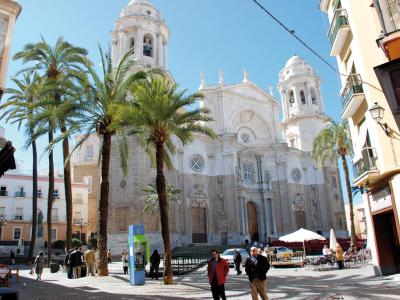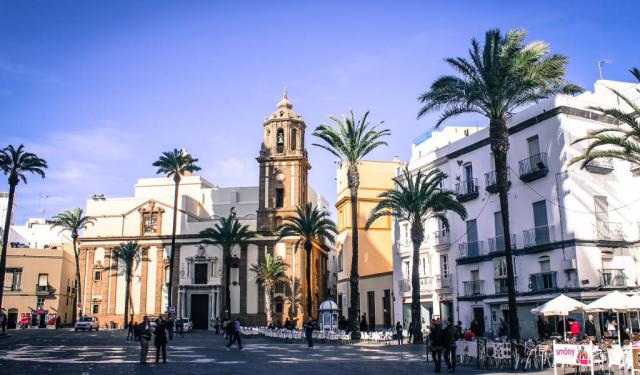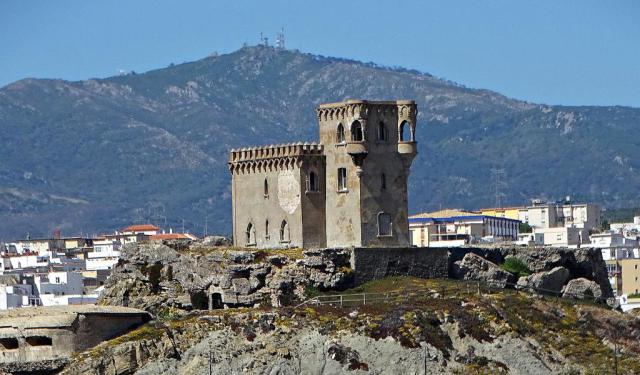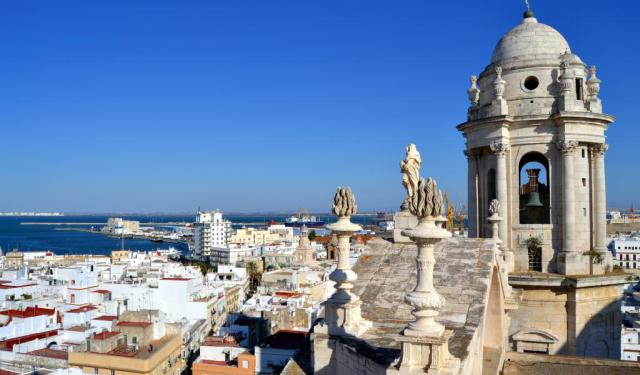Cadiz Cathedral and Square, Cadiz (must see)
The 18th century was Cádiz’s golden era-literally. Gold from the Americas was flowing in, wigs were high, and civic pride was even higher. So naturally, the city decided it needed a cathedral that didn’t just rival Seville’s-it had to outshine the Giralda, Seville's precious tower.
After the original architect stormed off in 1739, a tag-team of architects spanning nearly a century followed, each adding their own stylistic flair. The result was a cathedral that pirouettes from Baroque to Rococo to Neoclassical like it couldn’t make up its mind. Surprisingly or not, the cathedral ended up looking fabulous.
The layout follows the traditional cross shape, with three main aisles and a walkway that curves around the altar like a quiet loop. Rows of polished Corinthian columns hold up elegant vaulted ceilings, and there's a crypt downstairs big enough to make any vampire rethink retirement. The altar sits high and proud, commanding your gaze, while above it all, a dome crowns the space like a golden exclamation mark. And in the choir loft? Not one, but two powerful organs-more than enough to fill the church (and your spine) with musical thunder.
Nevertheless, the main showpiece is the Clock Tower, also known as the Levante Tower. Standing at 184 feet tall, it’s your best bet for sweeping views of the El Pópulo district, the Field of the South, and the harbor, with the Atlantic winking in the distance.
The Cathedral Square outside wasn’t always so open and grand-it was created during Cádiz’s 1721 urban makeover, which included demolishing a few modest houses to make room for this dramatic entrance. The square runs along the seafront and is paved in white marble, because if you're going to build a cathedral this extra, your plaza needs to match.
Don't miss the Rose Arch, which once led to the old Tablas Square and now serves as a charming pass-through to the Town Castle. Within the square itself, you’ll also find the Church of Santa Cruz (the old cathedral from 1669) and the Jesuit Church of Santiago, built in 1563 and still standing tall.
After the original architect stormed off in 1739, a tag-team of architects spanning nearly a century followed, each adding their own stylistic flair. The result was a cathedral that pirouettes from Baroque to Rococo to Neoclassical like it couldn’t make up its mind. Surprisingly or not, the cathedral ended up looking fabulous.
The layout follows the traditional cross shape, with three main aisles and a walkway that curves around the altar like a quiet loop. Rows of polished Corinthian columns hold up elegant vaulted ceilings, and there's a crypt downstairs big enough to make any vampire rethink retirement. The altar sits high and proud, commanding your gaze, while above it all, a dome crowns the space like a golden exclamation mark. And in the choir loft? Not one, but two powerful organs-more than enough to fill the church (and your spine) with musical thunder.
Nevertheless, the main showpiece is the Clock Tower, also known as the Levante Tower. Standing at 184 feet tall, it’s your best bet for sweeping views of the El Pópulo district, the Field of the South, and the harbor, with the Atlantic winking in the distance.
The Cathedral Square outside wasn’t always so open and grand-it was created during Cádiz’s 1721 urban makeover, which included demolishing a few modest houses to make room for this dramatic entrance. The square runs along the seafront and is paved in white marble, because if you're going to build a cathedral this extra, your plaza needs to match.
Don't miss the Rose Arch, which once led to the old Tablas Square and now serves as a charming pass-through to the Town Castle. Within the square itself, you’ll also find the Church of Santa Cruz (the old cathedral from 1669) and the Jesuit Church of Santiago, built in 1563 and still standing tall.
Want to visit this sight? Check out these Self-Guided Walking Tours in Cadiz. Alternatively, you can download the mobile app "GPSmyCity: Walks in 1K+ Cities" from Apple App Store or Google Play Store. The app turns your mobile device to a personal tour guide and it works offline, so no data plan is needed when traveling abroad.
Cadiz Cathedral and Square on Map
Sight Name: Cadiz Cathedral and Square
Sight Location: Cadiz, Spain (See walking tours in Cadiz)
Sight Type: Religious
Guide(s) Containing This Sight:
Sight Location: Cadiz, Spain (See walking tours in Cadiz)
Sight Type: Religious
Guide(s) Containing This Sight:
Walking Tours in Cadiz, Spain
Create Your Own Walk in Cadiz
Creating your own self-guided walk in Cadiz is easy and fun. Choose the city attractions that you want to see and a walk route map will be created just for you. You can even set your hotel as the start point of the walk.
Cadiz's Plazas Walking Tour
Nicknamed “the silver cup” for the way its peninsula juts into the Atlantic, Cádiz sparkles as one of Spain’s oldest coastal gems. The Old Town is a maze of narrow streets, whitewashed façades, and balconies that seem to compete over who can grow the brightest gardens. Add in centuries of Moorish, Baroque, and Neoclassical influence, and you’ve got a city that wears its history in layers... view more
Tour Duration: 1 Hour(s)
Travel Distance: 1.9 Km or 1.2 Miles
Tour Duration: 1 Hour(s)
Travel Distance: 1.9 Km or 1.2 Miles
Cadiz's Old Fortifications Walking Tour
“Cádiz is a silver cup, surrounded by walls and kissed by the sea.” The saying isn’t just poetry-it’s urban planning. For over 3,000 years, this port city has been circling itself with stone, preparing for whoever might come sailing over the horizon. And given Cádiz’s enviable position and wealth, plenty of enemies did.
After Columbus launched voyages two and four from here,... view more
Tour Duration: 2 Hour(s)
Travel Distance: 4.3 Km or 2.7 Miles
After Columbus launched voyages two and four from here,... view more
Tour Duration: 2 Hour(s)
Travel Distance: 4.3 Km or 2.7 Miles
Cadiz Introduction Walking Tour
Cádiz isn’t just old-it’s mythologically old. Some say Hercules himself founded the city after his tenth labor, fresh from slaying a three-headed monster and stealing a herd of red cattle. Others-less into mythology, more into maritime records-say it was the Phoenicians who rolled up in black ships around 1100 BC and named it Gadir, meaning “walled stronghold.” Either way, it’s been... view more
Tour Duration: 2 Hour(s)
Travel Distance: 2.8 Km or 1.7 Miles
Tour Duration: 2 Hour(s)
Travel Distance: 2.8 Km or 1.7 Miles






